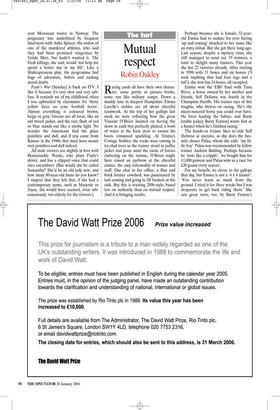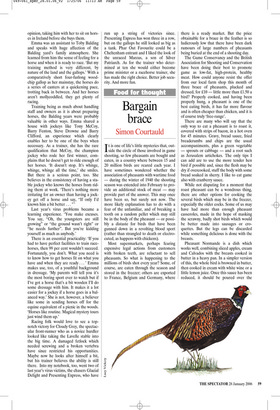Mutual respect
Robin Oakley
Racing yards all have their own character, some pretty as picture books, some run like military camps. Down a muddy lane in deepest Hampshire Emma Lavelle’s stables are all about cheerful teamwork. At the top of her gallops last week we were reflecting how the great Vincent O’Brien insisted on having the straw in each box perfectly plaited, a bowl of water at the barn door to ensure his boots remained sparkling. At Emma’s Cottage Stables, the rooks were cawing in ivy-clad trees as the trainer stood in puffer jacket and jeans amid the circle of horses clattering on the tarmac, O’Brien might have raised an eyebrow at the cheerful clutter, the easy informality of trainer and staff. Our chat in her office, a flint and brick former cowshed, was punctuated by lads coming and going to fill buckets at the sink. But this is training 2006-style, based less on authority than on mutual respect. And it is bringing results. Perhaps because she is female, 32-yearold Emma had to endure for ever having ‘up and coming’ attached to her name like an extra initial. But she got there long ago. Last season, despite a mystery virus, she still managed to send out 19 winners, a total to delight many trainers. This year she has 22 victories already. After starting in 1998 with 11 boxes and six horses (‘I took anything that had four legs and a tail’), she now has 54 boxes, all occupied.
Emma won the EBF final with Tana River, a horse owned by her mother and friends. Self Defense was fourth in the Champion Hurdle. His trainer says of this toughie, who thrives on racing, ‘He’s the nicest-natured horse you could ever have. He loves leading the babies, and Barry [stable jockey Barry Fenton] wants him as a hunter when he’s finished racing.’ The hands-on trainer likes to ride Self Defense at exercise, as she does the twomile chaser Palua, whom she calls ‘my little boy’. Palua was recommended by fellow trainer Andrew Balding. Perhaps because he ‘trots like a cripple’, ‘we bought him for 11,000 guineas and Palua wins us a race for £20 grand every season’.
For my benefit, we drove to the gallops that day, but Emma is not a ‘4 x 4 trainer’. ‘You never learn as much from the ground. I tried it for three weeks but I was desperate to get back riding them.’ She sets great store, too, by Barry Fenton’s opinion, taking him with her to sit on horses in Ireland before she buys them.
Emma was an assistant to Toby Balding and speaks with huge affection of the Balding yard’s family atmosphere. She learned from him the sense of feeling for a horse and when it is ready to race. ‘But my training method is very different, by nature of the land and the gallops.’ With a comparatively short four-furlong woodchip gallop as her mainstay, the horses do a series of canters at a quickening pace, trotting back in between. And her horses aren’t mollycoddled, they get plenty of racing.
Training being as much about handling staff and owners as it is about preparing horses, the Balding years were probably valuable in other ways. Emma shared a house with jockeys like Tony McCoy, Barry Fenton, Steve Drowne and Barry Clifford, an experience which clearly enables her to be one of the boys when necessary. As a trainer, she has the rare qualification that McCoy, the champion jockey who rode her first winner, complains that he doesn’t get to ride enough of her horses. ‘It doesn’t stop. It’s whinge, whinge, whinge all the time,’ she smiles. But there is a serious point, too. She believes in the consistency of having a stable jockey who knows the horses from riding them at work. ‘There’s nothing more irritating for an owner than having a jockey get off a horse and say, “If only I’d known him a bit better ... ”’ Last year’s virus problems became a learning experience. ‘You make excuses. You say, “Oh, the youngsters are still growing” or “the ground wasn’t right” or “he needs further”. But you’re kidding yourself as much as anybody.’ There is an essential practicality: ‘If you had to have perfect facilities to train racehorses, then 99 per cent wouldn’t succeed. Fortunately, you don’t. What you need is to know how to get horses fit on what you have and when they are ready ... ’ Emma makes use, too, of a youthful background in dressage. ‘My parents will tell you it’s the most boring sport ever to watch but if I’ve got a horse that’s a bit wooden I’ll do some dressage with him. It makes it a lot easier for a jockey if a horse goes in a balanced way.’ She is not, however, a believer like some in sending horses off for the equine equivalent of a picnic in the woods. ‘Horses like routine. Magical mystery tours just wind them up.’ Racing folk would love to see a topnotch victory for Cloudy Grey, the spectacular front-runner who as a novice hurdler looked like taking the Lavelle stable into the big time. A damaged fetlock which needed screwing and a broken vertebra have since restricted his opportunities. Maybe now he looks after himself a bit, but his trainer believes the ability is still there. Into my notebook, too, went two of last year’s virus victims, the chasers Glacial Delight and Presenting Express, who have run up a string of victories since. Presenting Express has won three in a row, but on the gallops he still looked as big as a tank. Phar Out Favourite could be a Cheltenham entrant and I liked the look of the unraced Marcus, a son of Silver Patriarch. As for the trainer who determined at ten she would either become prime minister or a racehorse trainer, she has made the right choice. Better job security. And more fun.























































 Previous page
Previous page